You own a website. you were working on it heartily & were trying so hard to rank it at top of the search engines. But then you came to know that your hard work isn’t enough to rank higher! Maybe not even close!
So, you wasted trillions of seconds to find the answer to “why?”. Then you learned about the term “SEO” and got so many questions such as: What is SEO? Why it’s important? How to get started with SEO? What needs to be fixed and how? etc.
Don’t worry, here we are to clear your questions and help you figure out the ways to optimize your website for the best SEO score!
So, make your mindset and focus, and keep your patience. This article may seem huge but, in the end, it will be worth it! Trust us!
What Is SEO?
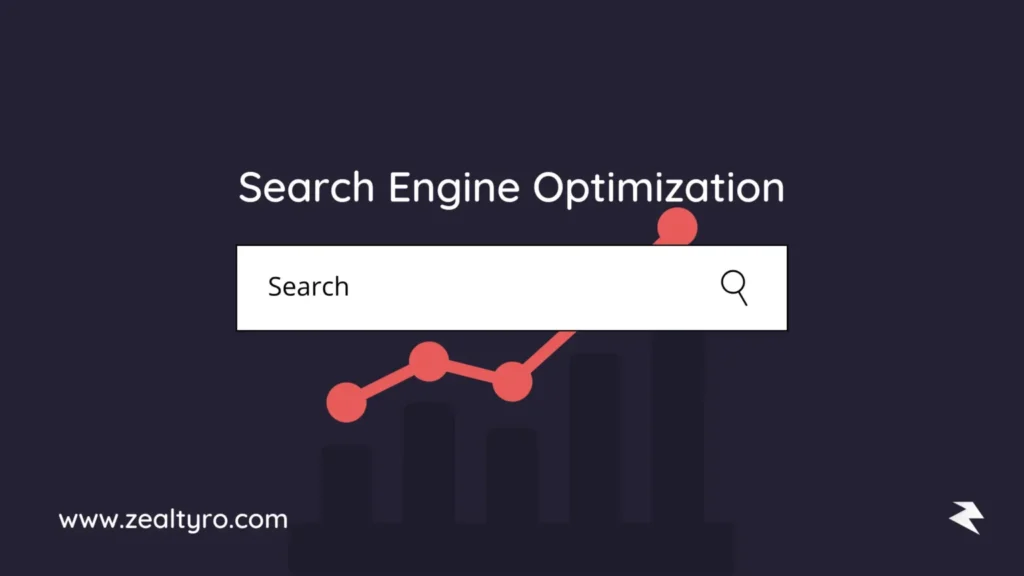
SEO stands for “Search engine optimization”. It is the best practice of optimizing a website to increase your visibility in search engines organically by improving your ranks on result pages.
Most people find SEO too time-consuming and may have seen it as less effective for not having proper optimizations. But it’s not as complicated as it seems to be!
Why SEO is so Important?
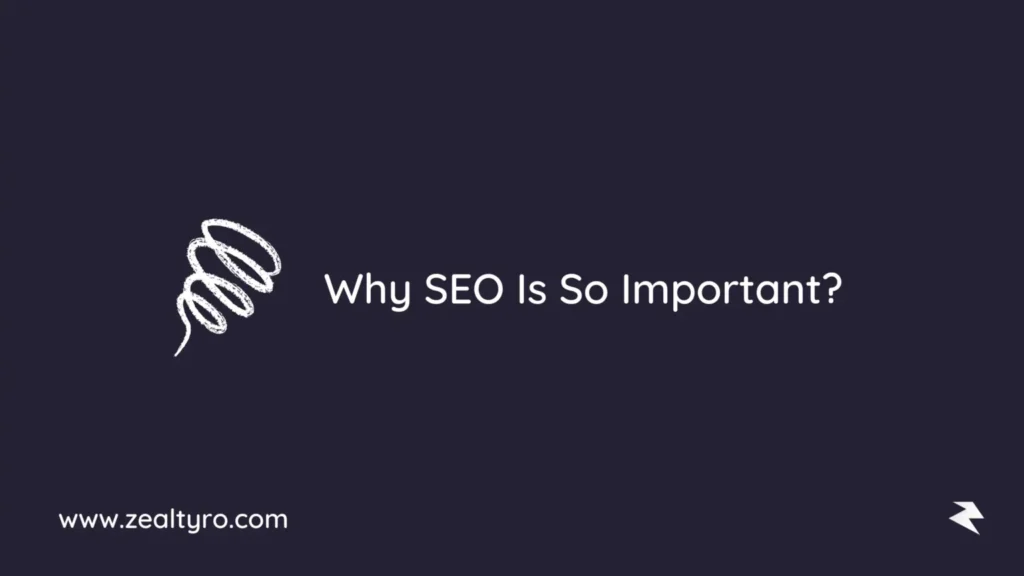
According to the Digital 2022 October Global Statshot Report, 63.5% of the world’s population uses the internet. These people search different topics on different search engines (e.g. Google) every day. So, ranking higher on these search engines will help you to get more traffic and visibility. And that’s why SEO is essential. It helps search engines understand your website and its content better.
There are many reasons behind you should consider giving time to improve SEO for your web pages.
1. SEO Helps To Get More Website Traffic
Traffic that comes through search engines is marked as Organic Traffic. Organic traffic is the best because you don’t need to spend millions of dollars to get visitors to your website. And SEO helps you to gain that kind of traffic.
SEO will help you to rank higher on search engines. Do you know that the higher your rank is on those search engines, the higher traffic you will be able to get? Around 75% of the search clicks that searchers generate are only from the first page of the search engines!
If you rank higher in the search engines, you may receive a decent percentage of search clicks for those search queries! If your website is not ranking near the top, you will likely see fewer visitors and click-through rates (CTR).
2. SEO Brings Consistent Traffic
Unlike other traffic acquisitions such as social media, pages that rank well in search engines are likely to receive more consistent traffic.
According to a report, Google receives more than 5 billion searches per day. So, if you are ranked well in search engines, you can be hopeful that you will receive consistent organic traffic every day! It may take a while before you can see passive results coming through your SEO strategy but trust us, this is worth it.
3. SEO Improves User Experience
Ranking in search engine result pages is determined by various factors. By applying proper SEO strategies, you ensure that: your website loads faster and has valuable content, not repeated words/lines, has navigation friendliness, etc. Which improves the user experience and helps you to get more impressions, reduce your bounce rate, convert your visitors into investors, etc.
So, unless you ensure a proper user experience you won’t be able to rank on the top and because of optimizing your SEO, your visitors are likely to come over and over to your site for related topics and may become an investor or regular visitors of your website!
How Do Search Engines Work?
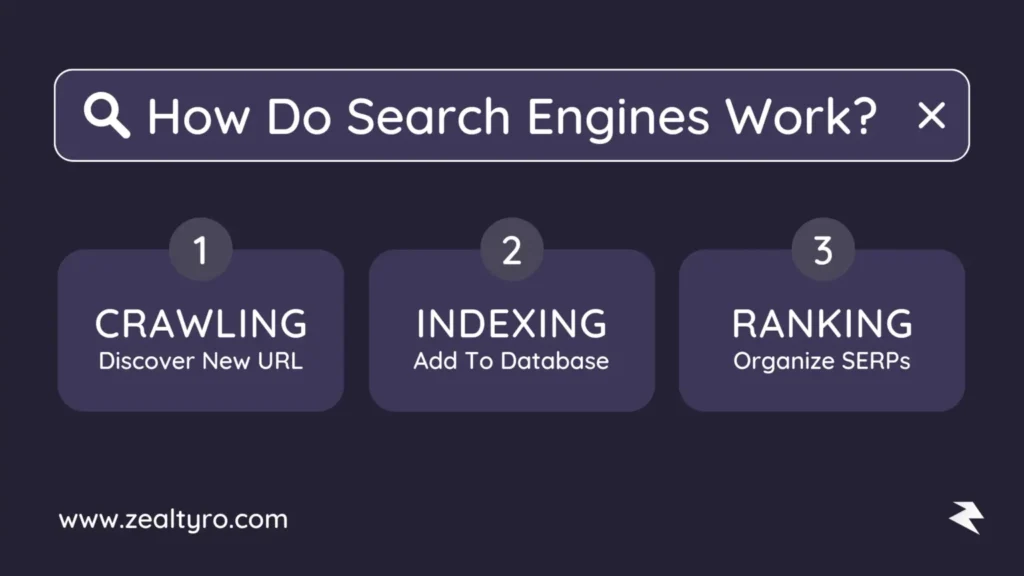
To understand the SEO fundamentals, it’s vital to understand how the search engines work. A search engine (e.g. Google) follows 3 steps before a website can be served to the searchers. They are:
- Crawling: Search Engines use robots ( known as Spiders or Crawlers) to follow URLs on the web to discover new content such as webpages, videos, images, attachments, etc. When they find something new, they gather data from it, follow links to other pages on that, and finally, send the gathered information to the search engines.
- Indexing: If Spiders/Crawlers find unique new content, they get added to the discovered URLs (Search Index) database of search engines.
- Ranking: As soon as a new URL gets added to the search index, the search engines try to find the most relevant results to less relevant results on search results and organise them.
What Is Needed for a Good SEO Score?
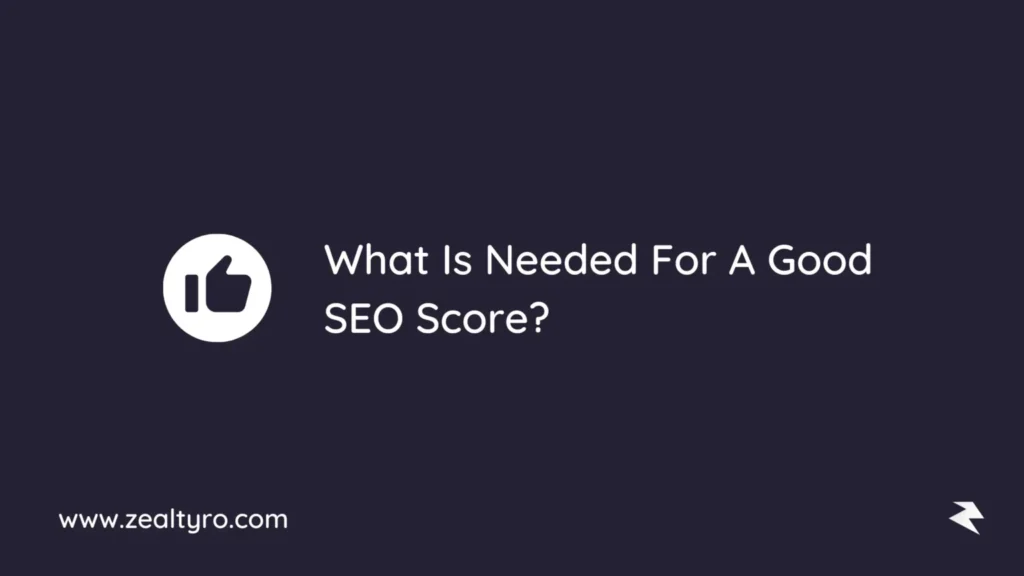
As we mentioned before, the SEO score depends on several factors. The more factors you can ensure, the better your SEO score will be. Here are some of those factors:
1. Write Quality Contents
Content is king, we can also call it the heart of a website. Writing regular useful content and keeping it updated with the latest things is the key. But make sure you are writing for human beings instead of search engines.
The content that understands visitors’ intentions and provides actual answers, will have more chances to rank higher than keyword-based content that is made for search engines. So, stop worrying about search engine rankings, and provide accurate answers that focus on user experience and interests.
2. Improve User Experience
User experience is one of the most important things that need to be kept in mind. Make sure you are not losing your users. You need to ensure that you have easy navigation, relevant internal linking, relevant content, etc. Avoid using excessive ads, and tiny hard-reading fonts as they impact the user experience badly.
Make sure to use headings, paragraphs, and other tags to beautify your texts instead of using stuffing texts. Stuffing texts make it harder to read and thus you may lose a visitor forever. Also, try to include your keywords in your headings and content.
3. Optimize Site Speed
Site speed matters a lot. You may lose a valuable visitor just because of having a slow site speed, not only that but also search engines cares about that.
Imagine waiting for a long time just to see some content. Won’t you think you would leave a site like that? Yes, you would. So, what can be done? Reduce using excessive codes, and linking to external CSS that slows your website and make sure to use optimized web images instead of using normal images (e.g. Webp format). Images can reduce a site’s speed by more than 50%! Also, try avoiding using Iframes.
4. Add Cross-device Compatibility
Imagine visiting a site from a mobile or another device that is only made for desktops. How annoying it is! Make sure to optimize your website to be resized properly to make it able to be read on any device of any size.
Make your website responsive on all devices, this can be done by using bootstrap or responsive themes. Search engines prefer responsive websites more than other websites for mobile users. So, if you don’t want to lose a traffic source of mobile users for your website, then optimize it now!
5. Add Meta Descriptions And Title Tags
Meta Description is a short description of your content that appears with your content title in search results. Adding Meta Description isn’t necessary for SEO but it can help to attract visitors from search results and increase Click-through rates (CTR).
So, it is recommended to use a catchy interesting meta description for your content. But make sure it’s relevant to your content.
Title Tags are used to tell the search engines about the topic of your content. This is a vital part to improve your SEO score by a decent percentage! Choosing a perfect Title can be time-consuming but this is worth it.
Many writers spend days after day just to find a perfect title for their content, something this takes more time than their content. So, you can understand how much important this can be!
6. Use Properly Tagged Optimized Images
Images are one of the most ignored factors for many content creators. But this can be the main culprit for getting a bad SEO score!
Most of the time creators forget to add alt attribution to their images. Search Engines can’t see your images but can read your image alt attribution that describes the content of the images. Adding alt attribution to your image as accurately as possible, will increase the chances of your images being appeared in the Google Image search.
Also, it is important to optimize your images to reduce their size for better site performance. You may use webp format for images.
What Must Be Avoided for Good SEO Score?
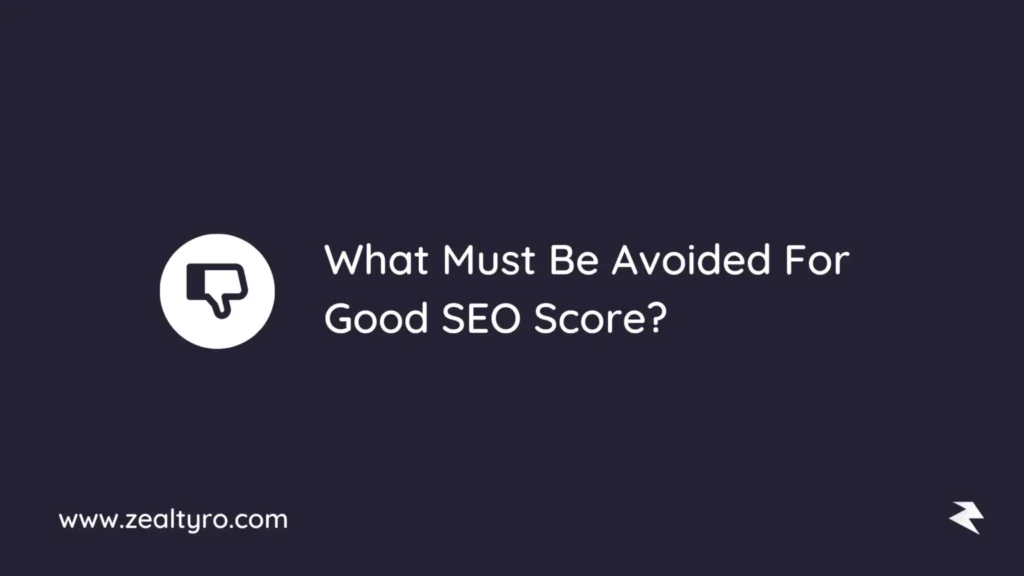
It doesn’t matter how much effort you make to improve your SEO score, trying certain things must be avoided! Following those certain things may result in penalties on search engines, especially Google. So, stop practising these things.
1. Keyword Stuffing
Using keywords in your content can help to rank better in search engines but overusing them affects the readability and makes it junky for the readers. This isn’t a good practice to place keywords in every line or even paragraph. Avoid using excessive keywords in the content and provide relevant content to get returning visitors.
2. Annoying Ads
You may want to earn more money every day from your site. So, you added a lot of ads from different platforms. Stop It Right Now! Excessive ads annoy the readers and hamper the pleasure of reading. It also makes your content look spammy which leads to visitors leaving your site and slows your site.
It never means that more ads will lead to more revenue. The more ads you have on your website the less CPM the advertisers will bid on your website. So, avoid adding excessive ads.
3. Duplicated Content
Duplicated content is avoided by search engines whether it’s from your website or another. Avoid copying and pasting things from other websites. Create original content instead. It is the foremost thing to rank higher in search engines.
If you have duplicated content, your content is likely to be avoided by the search engines and you may end up not getting indexed in search results.
4. Hidden Text And Links
Hidden text and links are one of the ways to manipulate rankings. These text and links are not visible to visitors but to the search engine crawlers. So, aren’t you discriminating against your visitors and search engines? STOP! This can result in getting punishments from search engines such as permanent bans!
Avoid using texts with zero sizes, white texts on a white background or other colour text with similar colour backgrounds, positioning texts off-screen, links on single characters or symbols, etc!
Final Words
If you want to rank higher on search engines and want to get more traffic, SEO is a must! In this article, we tried to cover all the basics of SEO. Start applying what you learned and make changes. It may take a while or even 2-3 weeks before you see good outcomes from your SEO but keep patient.
Keep doing SEO for every new content you create and observe your outcomes every week. You will see good results! Believe in yourself.




[…] If you want to know more about SEO check out this article. […]